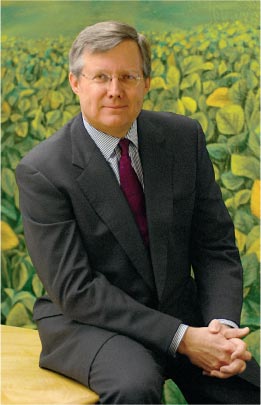 |
Alberto Weisser
Chairman & Chief Executive Officer, Bunge Limited
|
Dear Shareholders,
2005 was a challenging year for Bunge. We faced significant external headwinds, especially in our Brazilian fertilizer business, and we made some mistakes. The combination of these factors affected our operating profit, which fell for the first time since Bunge's public listing in 2001, declining to $456 million. Despite the difficulties, return on shareholders' equity in 2005 was 14 percent; return on invested capital was 10 percent; and our quarterly dividend increased by 15 percent to $0.15 per share.
We have taken numerous steps to position Bunge to perform better. 2006 will not be a return to normal in all areas—we still face some difficult market conditions—but we expect improved results. Over the long term, we should continue to create value for shareholders by executing on our global strategy: positioning Bunge for growth, focusing on efficiencies, improving customer service and quality and enhancing the company's operating model.
Overview of 2005
While we saw challenges in some areas, we saw positive performances in others. Bunge's U.S. agribusiness and global softseed operations benefited from solid margins and produced strong results. Our international marketing business and North American and Brazilian edible oil operations also recorded improved performances. Wheat milling had a great year.
These results were not enough to offset the effects of a weak operating environment in Brazil, caused by a severe drought that reduced crop yields, lower soybean prices resulting from consecutive large harvests in North America and a remarkably strong local currency.
The 20 percent appreciation of the real in 2005, and the timing of the appreciation, were the greatest challenges we faced last year. They reduced farm profitability, raised Bunge's local costs and pressured margins. We did not respond quickly enough, and our risk management program was not optimal. We hedged our balance sheet exposure but not our local costs, and we did not effectively hedge the value of our fertilizer inventories.
The market situation in Brazil will improve more slowly than we had anticipated, but we took decisive steps at the end of 2005 to improve
our performance in the country.
- We reduced higher-priced fertilizer inventories by 20 percent, which should benefit margins during 2006.
- We began cost-reduction efforts in Brazil that will generate savings of US$60-80 million in 2006.
- We expanded and refined our risk management program to lower our exposure to the real by hedging both the balance sheet and expenses.
- We reduced our ongoing effective tax rate through a legal restructuring.
Most of these initiatives were in place by January and are producing results. They give us confidence that 2006 will be a better year for our Brazilian operations and for Bunge overall.
|



